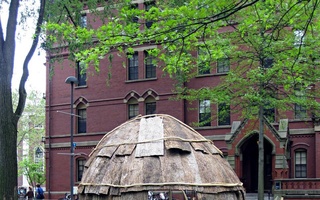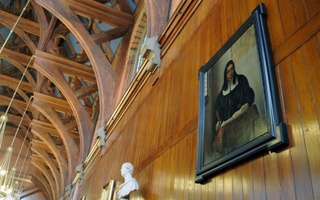Members of the Wampanoag Native American tribe convened at the Harvard Faculty Club Friday night for a clambake in honor of the tribe’s long standing ties with the University.
“It’s so important to celebrate and commemorate the shared history between Harvard and the Wampanoag,” said Tiffany L. Smalley ’11, the first member of the Wampanoag Tribe of Gay Head Aquinnah to graduate from the College since Caleb Cheeshahteaumuck ’1665.
The Wampanoag tribe hails from Rhode Island and southeastern Massachusetts, which includes present-day Nantucket and Martha’s Vineyard.
Smalley noted that the Charter of 1650, the documents which establishes the Harvard Corporation as the governing body of the College, mentioned Native American students. In fact, it stated that the College should serve both “English and Indian youth.”
Attendees at the clambake included Reverend Jonathan L. Walton, the Pusey Minister in Memorial Church, and the Honorable Tobias J. Vanderhoop, the chairman of the Wampanoag Tribe of Gay Head Aquinnah and a 2008 Kennedy School graduate.
“While I was at the Kennedy School, I cherished the opportunities and knowledge that I could then bring back to my community,” Vanderhoop said. “But there is still a ways to go in terms of Native American inclusion.”
The Honorable Cedric Cromwell, chairman of the Mashpee Wampanoag Tribe, agreed that more should be done to include Native American tribes.
Cromwell has orchestrated an effort to integrate Harvard with the Native American community. He lobbied the College to award Joel Iacoomes, a Wampanoag community member who attended the College but died in a 1665 shipwreck shortly before graduating, with a posthumous degree in 2011.
Yet Cromwell highlighted that Harvard must continue to foster relations with local tribes—particularly by recruiting more indigenous students.
During the 2018 admissions cycle, Native Americans were the sole group of non-white students whose application rates had not increased.
Judith Sanford-Harris, a member of the Mashpee Wampanoag Elders Council, said that Harvard can do more to create a welcoming environment for Native American applicants.
“More Native faculty—and not just faculty hired to teach Native studies courses—could attract some students,” Sanford-Harris wrote in an email to The Crimson. “Scholarships earmarked for Native students, in addition to the financial aid already offered, would also go a long way in encouraging students to apply and to matriculate if accepted.”
—Staff writer Amna H. Hashmi can be reached at amnahashmi@college.harvard.edu. Follow her on Twitter @amna_hashmi.
Read more in News
HarvardX To Provide Online Courses Restricted to AlumniRecommended Articles
-
 Wetu in the Yard Suffers Damage
Wetu in the Yard Suffers Damage -
 Wampanoag To Be Honored With Degree
Wampanoag To Be Honored With Degree -
Class of 2011 Includes First Wampanoag Indian Graduate Since 1665When Tiffany L. Smalley ’11 receives her diploma at the Commencement ceremony on May 26, she will become the first Wampanoag Indian to graduate from Harvard College since 1665.
-
Warren Speaks Out on Heritage AccusationsAfter weeks of speculation, Elizabeth Warren released an official statement Thursday confirming that she had claimed Native American heritage to both Harvard University and the University of Pennsylvania. Warren remained adamant, however, that her descent did not have an impact on job offers, as those who hired her had no knowledge of her background when they offered her the positions.
-
 Kids Get Crafty With Indian Projects
Kids Get Crafty With Indian Projects -
Giving Thanks and Learning through ExperienceToday, Commander Herrington is one of many incredible Native American leaders who are using science and education to transform the native community and the United States, and that is something we can all be thankful for.













